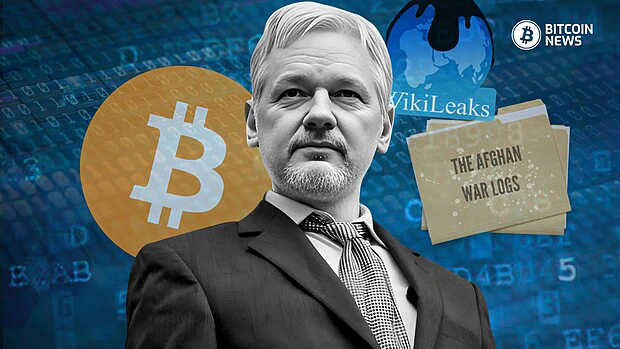In a first, WikiLeaks is launching Project Spartacus to store 76,911 Afghan War Logs on the Bitcoin blockchain for eternity. This initiative, led by Julian Assange’s team and supported by free speech advocates, uses blockchain to make these documents unerasable and uncensorable.
The Afghan War Logs were leaked in 2010 by Chelsea Manning and published by WikiLeaks. They are over 91,000 US military documents detailing US operations in Afghanistan from 2004 to 2010.
They contained information on civilian casualties, covert military operations and interrogation techniques. Now WikiLeaks is making sure these records are never deleted.

“It’s very important for our society to learn from our mistakes,” said Gabriel Shipton, Assange’s brother and chairman of the Assange Campaign. “So future generations can see what war looks like and who to hold accountable.”
WikiLeaks is using Bitcoin’s blockchain to preserve these records because it’s decentralized and tamper proof.
Through Ordinals, the Afghan War Logs will be encoded into tiny units of Bitcoin called satoshis. Once inscribed these files will be stored across multiple blocks on the blockchain so they can never be deleted.
“Having the war logs on a platform that’s distributed by nodes all over the world is an incredible use case for Ordinals as a protocol, this information should last forever,” said Shipton. By using Bitcoin, Project Spartacus means the logs will be available even if WikiLeaks’ website or other servers go down.
Related: Magic Eden Ordinals | A New Way Of Preserving Data
The project is using OrdinalsBot, a tool that can handle large data inscription on the Bitcoin network. Toby Lewis, founder of OrdinalsBot, said it will take a long time to inscribe 76,911 documents. “It’s not a small collection,” he said.
Project Spartacus shows WikiLeaks’ commitment to innovation in the fight for free speech.
This is not WikiLeaks’s first interaction with Bitcoin. In 2010 when major banks cut off WikiLeaks from traditional payment systems, the foundation started accepting bitcoin donations. They raised over $30 million and kept the show on the road.
Julian Assange using Bitcoin as a lifeline back then proved its ability to resist censorship. Despite his concerns, even Bitcoin’s creator Satoshi Nakamoto noted the significance of WikiLeaks adopting the currency.
“It would have been nice to get this attention in any other context. WikiLeaks has kicked the hornet’s nest and the swarm is headed towards us” Nakamoto wrote in 2010, worried about the sudden attention on Bitcoin when it was still in its infancy.
The Afghan War Logs are one of WikiLeaks’ most sensitive releases.
Critics argued that publishing the documents would put lives at risk but Shipton said Assange took steps to protect individuals named in the files. Shipton said Julian created technology to redact sensitive information.
“Julian developed technology to protect people and these releases ended this war. So I think those benefits outweigh the accusations.”
The release of these logs changed the public’s understanding of the Afghanistan war, revealing untold stories of military abuse and questions about accountability in modern war.
Project Spartacus aims to preserve this legacy so these stories are available for future generations.
But it’s not just about preserving history. Project Spartacus is also a tribute to Julian’s life long commitment to transparency and free speech.
Julian, who spent years fighting extradition and was just released from prison after taking a plea deal, has always fought for the right to access information.
Stella Assange, Julian’s wife, called it a new frontier for data protection. She pointed out how blockchain allows for decentralized publishing so that important information can’t be censored by governments or corporations.
The blockchain and Bitcoin communities have rallied around Project Spartacus. Many see it as an example of how tech can be used to protect information.
“It’s in the name as well—Project Spartacus—you’re standing up, and each Bitcoiner is standing up alongside Julian,” said Toby Lewis.
“It’s how they can share a piece of history that’s very controversial but very important to Bitcoiners. It’s a moment in time.”
The project is already underway, with over 2,000 documents already inscribed in the first phase in 2023. From December 12 2024 anyone will be able to mint the Afghan War Logs onto the Bitcoin blockchain. It’s free, but participants have to pay the Bitcoin network fees.
Despite the hype, not everyone in the Bitcoin space is a fan of these projects. Many say Bitcoin’s purpose is to be a monetary network and using blocks to store arbitrary data goes against the original vision and bloats the blockchain.
Related: Bitcoin Fees Skyrocket | Community Divided on Ordinals
As WikiLeaks continues with Project Spartacus, the Afghan War Logs will be a permanent record of the importance of transparency in global conflicts.
By using blockchain technology WikiLeaks is not just preserving history, it’s making sure the truth can’t be deleted, no matter how inconvenient it is for those in power.
“Having this on the Bitcoin Blockchain just takes Julian’s and WikiLeaks’ legacy to the next level. The Afghan War Diary is no longer on a service that can go down,” said Shipton.
This is just another way they’re giving the public unfiltered information and setting the precedent for how tech can protect free speech in the digital age.










